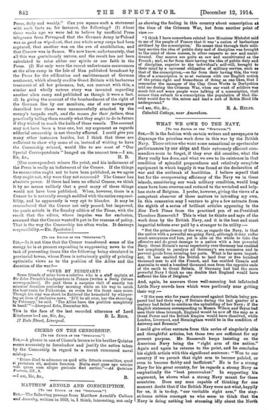WHAT WE OWE TO THE NAVY.
[To TUT EDITOR OP THY " SPECTATOR...1 Sin,—It is the fashion with certain writers and newspapers to disparage the priceless work done in this war by the British Navy. Those critics who want some sensational or spectacular performances by our ships and their extremely efficient com- manders seem to forget, if they ever did consider, what the Navy really has done, and what we owe to its existence in that condition of splendid preparedness and relatively complete equipment in which happily it was found at the declaration of war and the outbreak of hostilities. I believe myself that but for the overpowering efficiency of the Navy we in these islands, considering our weak military condition, would long since have been overrun and reduced to the wretched and help- less state of Belgium. I prefer, however, giving the views of a competent observer of these matters to intruding my own.
In this connexion may I venture to give a few extracts from the eighth of a series of brilliant articles appearing in the New York Times from the practised pen of ex-President Theodore Roosevelt P This is what he thinks and says of the work done by the British Navy, and it is the best and most impartial tribute ever paid by a stranger to its utility :—
" But the prime lesson of the war, as regards the Navy, is that the nation with a powerful sea-going Navy, although it may suffer much annoyance and loss, yet is able on the whole to take the offensive and do great damage to a nation with a less powerful Navy. Great Britain's naval superiority over Germany has enabled her completely to paralyze all Germany's sea commerce and to prevent goods from entering her ports. What is far more import- ant, it has enabled the British to land four or five hundred thousand men to aid the French, and has enabled Canada and Australia to send a hundred thousand men from the opposite ends of the earth to Great Britain. If Germany had had the more powerful Navy I think no one doubts that England would have suffered the fate of Belgium."
And, again, he answers those well-meaning but infatuated Little Navy crowds here which were perilously near getting their way :— " If the men who for years clamoured against Britain being pre- pared had had their way ; if Britain during the last quarter of a century had failed to continue the upbuilding of her Navy ; if the English statesmen corresponding to Messrs. Wilson and Bryan had seen their ideas triumph, England would be now off the map as a Great Power and the British Empire would have dissolved, while London, Liverpool, and Birmingham would be in the condition of Antwerp and Brussels."
I could give other extracts from this series of singularly able and thoughtful articles, but these two are sufficient for my present purpose. Mr. Roosevelt keeps insisting on the American Navy being the " right arm of the nation." Again and again he returns to the point, and he concludes his eighth article with this significant sentence : "Woe to our country if we permit that right arm to become palsied, or even to become flabby and inefficient." He is for a strong Navy for his great country, for he regards a strong Navy as emphatically the "best peacemaker." In supporting hie argument, he shows what a strong Navy meant for these countries. Does any man capable of thinking for one moment doubt that if the British Navy were not what, happily for ns, it is to-day, "our veritable right arm," the stay. at-home critics amongst us who seem to think that the Navy is doing nothing but steaming idly about the North
Sea would have brought home to them in all its painful reality the awful horrors of the present disastrous and devastating war P We can never too highly appreciate the debt we owe to the Navy. To the Navy alone we are indebted for such security and safety as we now and will, I trust, to
the end continue to enjoy.—I am, Sir, &c. R. J. KELLY. L5 Wellington Road, Dublin.
[Our correspondent preaches to the converted. We have held throughout the war that the Navy has done its duty, and more than its duty, and that to it we owe all that we possess as a nation. But for it we should indeed be of all men most miserable. The Navy could not have done more than it has done. It has performed its most difficult tasks with precision. Only the wayward or the ignorant could think of demanding more, or could attempt to hound the Navy into action—in order that there may be "something more to show" for the Fleet and to prove its activities. To make such criminally foolish demands is to court disaster.—ED. Spectator.]















































 Previous page
Previous page